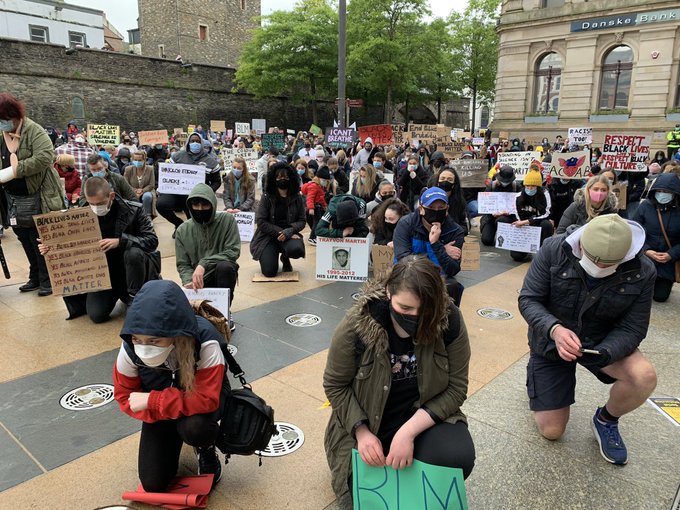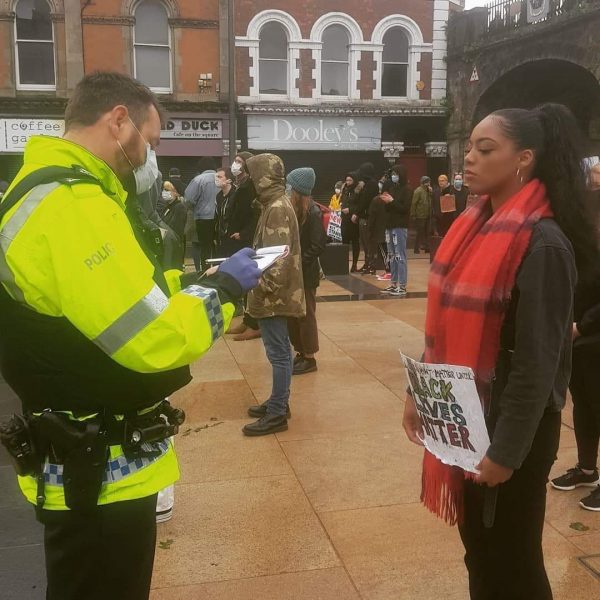
Protestors in Derry take the knew at Black Lives Matter rally earlier in June
The board has questioned whether its approach was lawful and called for a review of all fines and prosecutions from the rallies on June 6.
Officers issued 68 fines under regulations limiting public gatherings.
The chief constable said the PSNI would “take time” to consider the findings.
The outdoor events, attended by hundreds of people, were in response to the death of George Floyd in the United States in May.
The Policing Board tasked its human rights adviser, John Wadham, to undertake a wide-ranging review of the policing response to Covid-19 between March and June.
Overall, the force’s performance is judged “generally positive”.
The PSNI had to contend with rules they had no advance sight of, that changed frequently and were “often flawed or had significant gaps”.
However, the report made critical observations of the PSNI over the Black Lives Matter protests, amid allegations a harsher stance was taken compared to other gatherings.
At the time, politicians had appealed for the rallies not to take place.
Operational orders to officers recognised the need to “keep people safe” during the pandemic.
But there was no mention of facilitating peaceful protests, in line with human rights law.
Footage from CCTV cameras and police body-worn video “reflect the absence of any careful consideration of the right to protest”, the report found.
“Protesters who raised their rights were told the (health) regulations were the law… none of the clips appeared to consider the attempts by the protesters to obey social distancing guidance.
“The approach sent the wrong message and damaged the reputation of the PSNI.”
It added: “A court might rule that the actions of the PSNI were unlawful.”
There are currently a number of legal actions challenging the police response.
The report also remarked that the Ethnic Minority Police Association of the PSNI has taken issue with how the events were dealt with.
“The association noted that the previous instruction to officers that no fines should be issued without consent from senior officers did not apply during these protests.”
The handling of the rallies is also subject to an investigation being conducted by the Police Ombudsman.
Reacting to the report, the director of Amnesty International here, Patrick Corrigan, said: “The police’s potentially discriminatory approach to the protests seriously damaged community relations – damage which must now be repaired.
“No-one should be left with a criminal record for taking a peaceful, socially-distanced stand against racism.”
The board’s report also stated that the use of spit hoods should cease by 31 December.
They were introduced at the start of the health emergency in March, following a number of incidents where officers were spat at or bitten by members of the public.
The report found that personal protection equipment should be adequate to protect officers instead.
In a statement, Chief Constable Simon Byrne said: “The Police Service of Northern Ireland has received a copy of the review.
 “We welcome the report and the scrutiny into the police response. We will now take time to consider its findings and recommendations.”
“We welcome the report and the scrutiny into the police response. We will now take time to consider its findings and recommendations.”
The Police Federation, which represents rank-and file-officers, said the PSNI should resist the recommendation to phase out spit guards.
Chairman Mark Lindsay said: “We are of the firm view that guards afford additional and much-needed protection for officers who fear for their own health and well-being.
“It is wrong to deny them a key piece of equipment – equipment and protection they have been crying out for over many years.”
Tags:




